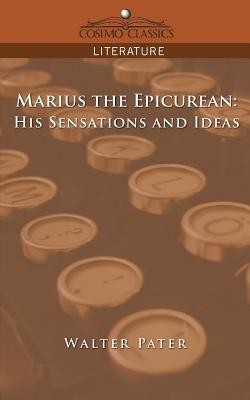
- We will send in 10–14 business days.
- Author: Walter Pater
- Publisher: Cosimo Classics
- ISBN-10: 1596055545
- ISBN-13: 9781596055544
- Format: 12.7 x 20.3 x 2.2 cm, minkšti viršeliai
- Language: English
- SAVE -10% with code: EXTRA
Reviews
Description
Yes! It was the one instance Marius, always eagerly on the look-out for such, had yet seen of a perfectly tolerable, perfectly beautiful, old age-an old age in which there seemed, to one who perhaps habitually over-valued the expression of youth, nothing to be regretted, nothing really lost, in what years had taken away. -from Marius the Epicurean With his thoughtful sensibility and appreciation of the artistic experience, Walter Pater exerted a dramatic influence over the Aesthetics of the mid to late 19th century: a movement of creative intellectuals, from writer Oscar Wilde to painter James McNeill Whistler, who held that art should be sensual and beauty the highest ideal. Pater's "cult of beauty" also profoundly affected 20th-century arts, literary, and cultural criticism. Here, in his only novel, a forerunner to the works of James Joyce first published in 1885, Pater takes us on one young man's personal journey from paganism to Christianity in ancient Rome, a didactic work in which Pater explores the role of religion in culture and in art and celebrates the aestheticism he championed in his criticism. Also available from Cosimo Classics: Pater's The Renaissance. British essayist and critic WALTER HORATIO PATER (1839-1894) was educated at Oxford University. He also wrote Imaginary Portraits (1887), Appreciations (1889), and the posthumously published Greek Studies (1895).
EXTRA 10 % discount with code: EXTRA
The promotion ends in 23d.19:45:40
The discount code is valid when purchasing from 10 €. Discounts do not stack.
- Author: Walter Pater
- Publisher: Cosimo Classics
- ISBN-10: 1596055545
- ISBN-13: 9781596055544
- Format: 12.7 x 20.3 x 2.2 cm, minkšti viršeliai
- Language: English English
Yes! It was the one instance Marius, always eagerly on the look-out for such, had yet seen of a perfectly tolerable, perfectly beautiful, old age-an old age in which there seemed, to one who perhaps habitually over-valued the expression of youth, nothing to be regretted, nothing really lost, in what years had taken away. -from Marius the Epicurean With his thoughtful sensibility and appreciation of the artistic experience, Walter Pater exerted a dramatic influence over the Aesthetics of the mid to late 19th century: a movement of creative intellectuals, from writer Oscar Wilde to painter James McNeill Whistler, who held that art should be sensual and beauty the highest ideal. Pater's "cult of beauty" also profoundly affected 20th-century arts, literary, and cultural criticism. Here, in his only novel, a forerunner to the works of James Joyce first published in 1885, Pater takes us on one young man's personal journey from paganism to Christianity in ancient Rome, a didactic work in which Pater explores the role of religion in culture and in art and celebrates the aestheticism he championed in his criticism. Also available from Cosimo Classics: Pater's The Renaissance. British essayist and critic WALTER HORATIO PATER (1839-1894) was educated at Oxford University. He also wrote Imaginary Portraits (1887), Appreciations (1889), and the posthumously published Greek Studies (1895).


Reviews